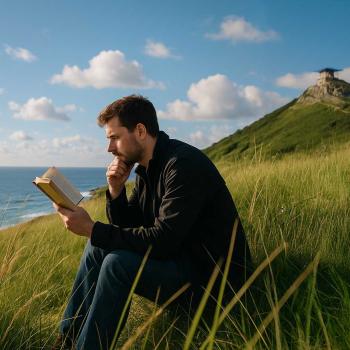What might your picture of this look like? How high is the Mountain of Victories? How accessible? What are the trees and grasses like? Are they lush and green, or sparse and yellowed? What color is the water in the spring? How blue is it, and how white? What spices do the Magi smell on this mountain? Where do the smells come from? Are there trees or plants or spices that are particularly holy in the eyes of God? What does paradise look like to you? What trees grow in your neighborhood? How might your community transform its own parks and gardens into places that are beautiful in God's sight?
I would also recommend reading each chapter slowly, and really taking time to discuss some of the book's more striking concerns. For example, the misogyny in Chapters 7-8 is shocking. We like to think we've made some progress on the status of women since the 2nd century. But have we? Do you think this is what Adam would have said to his sons? What do you suppose Eve might have said to them?
Just as the Revelation of the Magi imagines stories that lie in continuity with biblical events but don't appear in the Bible, let our faith communities do the same. Let us imagine our own stories of what happened "off-stage," so to speak. Let us imagine a relationship between Eve and her children, and what she might have taught them. And let us perform them. Making a character and his or her words your own is such powerful way to open yourself to them, heart and soul.
I think the greatest value of the Revelation of the Magi is the way in which it opens us up to a much greater understanding of Christian joy. The Magi constantly rejoice in the presence of the Star and the coming of the King, and they teach others to feel that joy as well. Through their accounts of the miraculous visit of the star, they repeatedly affirm fundamental beliefs about the character of God the Father: His compassion, mercy, kindness, and love. They also repeatedly affirm the humility this inspires in the faithful who receive these insights and rush to share them.
Only after diving deep within the Revelation of the Magi would I surface for Landau's introduction and conclusions. We learn about such basic issues as who might have written the tale, when, and for what purpose. And Landau offers his own insights into the meaning of the book. Your group might close by weighing the implications of Christian claims to exclusive access to God, and what that means in today's global village.
But in the end, what matters most is that in hearing, picturing, performing, and discussing, a Christian faith community might learn things of enormous value about God's love for His children, and His expectations of us. An encounter with the Revelation of the Magi is genuinely an encounter with revelation. But since it doesn't have the stigma of biblical canon clinging to it, it opens up possibilities for discussion and self-discovery around issues like sin, sexism, and Christian exclusivism that we can't discuss as comfortably when they are present within the pages of God's official Word.
As a result, this book promises a genuine encounter with the Incarnate God in this holy season of His coming.





